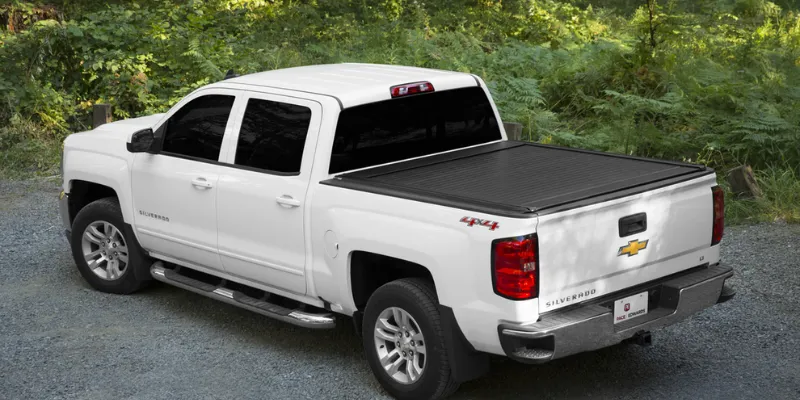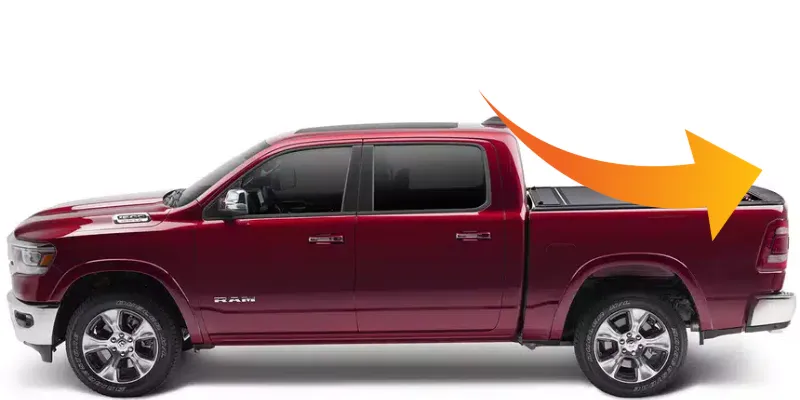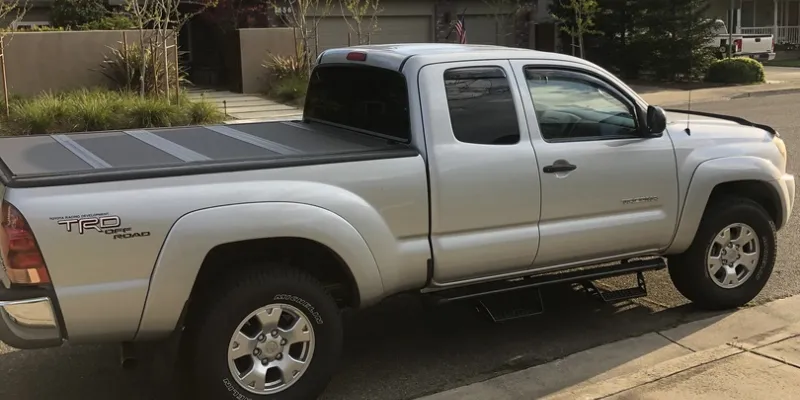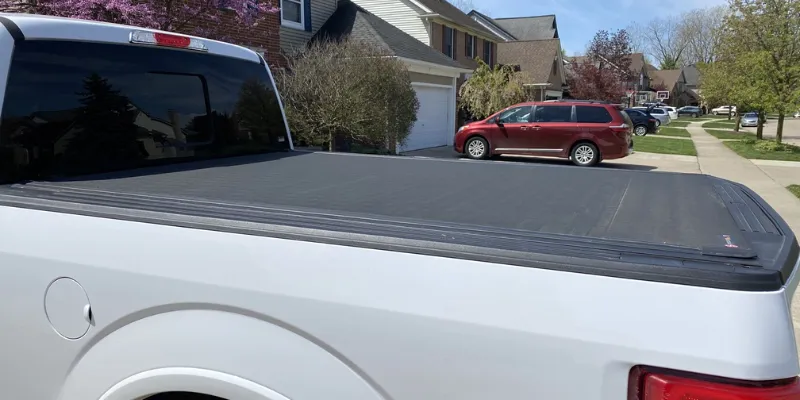Tonneau covers aren’t just about looks – they’re your secret weapon for serious savings.
Don’t just take my word for it; Ford’s research shows an 8-10% reduction in aerodynamic drag on the F150, translating to a 5% boost in highway fuel economy.
That’s real money back in your pocket. But here’s the burning question: how much could YOU save?
Our Tonneau Cover Gas Savings Calculator cuts through the guesswork, giving you a crystal-clear picture of your potential savings.
Tonneau Cover Gas Savings Calculator
How to Use the Calculator
Using our calculator is as easy as pie. Here’s how you can get your custom savings estimate:
Miles Driven Per Year: Start by entering the number of miles you typically drive in a year. Whether you’re a long-haul trucker or just use your pickup for weekend errands, every mile counts.
Miles Per Gallon (MPG): Next, input your truck’s current fuel efficiency. You can find this in your vehicle’s manual or by tracking your fuel consumption over a few fill-ups.
Cost Per Gallon: Enter the average price you pay for a gallon of gas in your area. This helps tailor the calculations to your local fuel costs.
Estimated Savings Percentage: Based on extensive research, we’ve set a default value of 7% for potential fuel savings with a tonneau cover. Feel free to adjust this if you have more specific information for your truck model.
Calculate: Hit the “Calculate Savings” button, and voila! You’ll see a breakdown of your potential savings.
The results will show you the gallons used per year without a cover, your annual fuel cost without a cover, gallons saved per year with a cover, and your new annual fuel cost with a cover.
But the real eye-openers are at the bottom: your total annual savings, monthly savings, and even how much you’re saving per mile!
Understanding Fuel Efficiency in Trucks

Before we get into the nitty-gritty of how tonneau covers improve fuel efficiency, it’s crucial to understand why trucks, by their very nature, tend to be gas guzzlers.
As a truck owner, I’ve often wondered why my pickup seems to drink fuel faster than I can pump it. The answer lies in the unique design and purpose of these vehicles.
Trucks are built for power and utility. They’re designed to haul heavy loads, navigate rough terrains, and withstand tough conditions.
This rugged build comes at a cost – aerodynamic efficiency. The large, boxy shape of a truck bed creates significant air resistance, especially at highway speeds.
It’s like driving with a parachute attached to the back of your vehicle!
Here’s where it gets interesting. The open bed of a truck creates a low-pressure zone that acts like a drag parachute, pulling your truck backward as you drive.
This phenomenon, known as “air recirculation,” forces your engine to work harder and burn more fuel to maintain speed.
But don’t lose hope! This is precisely where tonneau covers come into play.
By addressing this aerodynamic challenge, they offer a simple yet effective solution to improve your truck’s fuel efficiency. Let’s explore how they work their magic.
How Tonneau Covers Improve Aerodynamics

Now, let’s get into the exciting part – how tonneau covers transform your truck’s aerodynamics and boost fuel efficiency.
It’s not just theory; it’s science backed by rigorous testing and real-world results.
When you install a tonneau cover, you’re essentially streamlining your truck’s profile.
The cover creates a smooth surface over the truck bed, dramatically reducing air turbulence and that pesky “parachute effect” we talked about earlier.
Instead of air getting caught in the truck bed and creating drag, it now glides smoothly over the cover.
This aerodynamic improvement means your engine doesn’t have to work as hard to maintain speed, especially on highways where wind resistance is a major factor in fuel consumption.
It’s like giving your truck a helping hand, pushing it forward instead of holding it back.
Let’s look at some hard numbers.
According to a study by the Specialty Equipment Market Association (SEMA) conducted at the AeroDyn Wind Tunnel in Mooresville, North Carolina (a facility often used by NASCAR), tonneau covers can significantly reduce aerodynamic drag on pickup trucks.
Ford’s expert, Jack Williams, reported that they’ve seen “reductions of about 8 to 10 percent on the F150” in terms of aerodynamic drag.
This translates to “an average steady-state fuel economy improvement at highway speeds closer to 5 percent.” That’s a substantial improvement just from adding a cover to your truck bed!
But here’s the kicker – these benefits come without sacrificing the utility of your truck.
You still have full access to your truck bed when you need it. It’s a win-win situation: improved fuel efficiency when you’re driving, and full functionality when you’re hauling.
As someone who was initially skeptical, I can tell you that the difference is noticeable.
Not only in terms of fuel consumption but also in the smoother, quieter ride you experience at highway speeds.
It’s like upgrading your truck’s performance without touching the engine.
Factors Affecting Gas Savings with Tonneau Covers

While tonneau covers generally improve fuel efficiency, it’s important to understand that the actual savings can vary based on several factors.
As a truck owner, I’ve learned that these variables can significantly influence the effectiveness of your tonneau cover:
Driving Habits: Your driving style plays a crucial role. If you frequently drive at highway speeds, you’re likely to see more significant savings.
Why? Because aerodynamic drag increases exponentially with speed. The faster you go, the more your tonneau cover helps.
Type of Tonneau Cover: Not all covers are created equal. Hard covers typically offer better aerodynamics than soft covers, as they maintain their shape at high speeds.
Retractable covers can be particularly effective when fully closed.
Truck Model and Size: The impact of a tonneau cover can vary depending on your truck’s make and model.
Larger trucks with bigger beds might see more dramatic improvements due to the larger area being covered.
Load in the Truck Bed: If you frequently carry loads that prevent the tonneau cover from closing fully, you won’t get the full aerodynamic benefit.
The cover works best when it’s completely closed, creating a smooth surface over the entire bed.
Maintenance of the Cover: A well-maintained, properly fitted cover will perform better than one that’s loose or damaged.
Regular checks and adjustments can help ensure you’re getting the maximum benefit.
Weather Conditions: Believe it or not, weather can impact your savings.
Headwinds can increase drag, making your tonneau cover even more valuable, while tailwinds might reduce the noticeable impact.
Fuel Prices: While not directly affecting the amount of fuel saved, fluctuating gas prices will influence how much money you save.
Higher gas prices mean greater dollar savings for the same amount of fuel efficiency improvement.
Remember, the 7% savings we use as a default in our calculator is an average. Your actual savings might be higher or lower depending on these factors.
That’s why it’s crucial to consider your specific situation when estimating potential savings.
Interpreting Your Results

Now that you’ve used our calculator and understand the factors at play, let’s break down what your results mean and how to interpret them.
I’ll walk you through some examples to illustrate how different scenarios can affect your savings.
Let’s consider three hypothetical truck owners:
1. The Daily Commuter: Sarah drives her F-150 30 miles each way to work, 5 days a week, plus some weekend trips.
Her annual mileage is about 18,000 miles. Her truck gets 15 MPG, and she pays an average of $3.50 per gallon for gas. Calculator Results:
- Annual fuel cost without cover: $4,200
- Annual fuel cost with cover: $3,906
- Total annual savings: $294
- Monthly savings: $24.50
- Savings per mile: $0.0163 For Sarah, the savings might seem modest on a per-trip basis, but they add up to a significant amount over a year. That $294 could cover a nice dinner out each month or a weekend getaway!
2. The Weekend Warrior: Mike uses his Chevy Silverado mainly for weekend adventures, driving about 10,000 miles annually.
His truck gets 14 MPG, and he pays $3.75 per gallon for gas. Calculator Results:
- Annual fuel cost without cover: $2,678.57
- Annual fuel cost with cover: $2,491.07
- Total annual savings: $187.50
- Monthly savings: $15.63
- Savings per mile: $0.0188 Even with less annual mileage, Mike still sees substantial savings. The $187.50 he saves could pay for some new camping gear for his weekend trips!
3. The Long-Haul Trucker: John drives his Ram 2500 for work, covering about 50,000 miles a year.
His heavy-duty truck gets 12 MPG, and he pays an average of $3.25 per gallon for diesel. Calculator Results:
- Annual fuel cost without cover: $13,541.67
- Annual fuel cost with cover: $12,593.75
- Total annual savings: $947.92
- Monthly savings: $78.99
- Savings per mile: $0.0190 For John, the savings are significant. Nearly $1,000 a year in his pocket just from adding a tonneau cover! That could cover his truck’s annual maintenance costs or a nice bonus for himself.
These examples show that regardless of how you use your truck, a tonneau cover can lead to meaningful savings.
The key is to look at the long-term benefits. While the savings per mile might seem small, they accumulate quickly over time and miles driven.
Remember, these savings are just from fuel efficiency. When you factor in other benefits like cargo protection and improved security, the value proposition of a tonneau cover becomes even more attractive.
